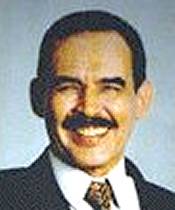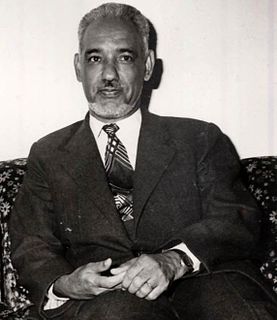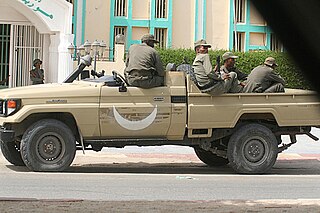The original inhabitants of Mauritania were the Bafour, presumably a Mande ethnic group, connected to the contemporary Arabized minor social group of Imraguen ("fishermen") on the Atlantic coast.

The first fully democratic Presidential election since 1960 occurred on 11 March 2007. The election was the final transfer from military to civilian rule following the military coup in 2005. This was the first time the president was selected by ballot in the country's history. The election was won by Sidi Ould Cheikh Abdallahi, who was ousted by a military coup in 2008 and replaced by general Mohamed Ould Abdel Aziz.

An Islamic republic is the name given to several states that are officially ruled by Islamic laws, including the Islamic Republics of Afghanistan, Iran, Pakistan, and Mauritania. Pakistan first adopted the title under the constitution of 1956. Mauritania adopted it on 28 November 1958. Iran adopted it after the 1979 Iranian Revolution that overthrew the Pahlavi dynasty. Afghanistan adopted it in 2004 after the fall of the Taliban government. Despite having similar names the countries differ greatly in their governments and laws.

French West Africa was a federation of eight French colonial territories in Africa: Mauritania, Senegal, French Sudan, French Guinea, Ivory Coast, Upper Volta, Dahomey and Niger. The capital of the federation was Dakar. The federation existed from 1895 until 1960.

Maaouya Ould Sid'Ahmed Taya is a Mauritanian military officer who served as the president of Mauritania from 1984 to 2005. Having come to power through a military coup, he was ousted by a military coup himself in 2005. Prior to his presidency, he was the 5th Prime Minister of Mauritania.

The flag of Mauritania is a green field containing a gold star and crescent, with a red stripe at the top and bottom of the field. The original national flag was introduced under the instructions of President Moktar Ould Daddah and the constitution of 22 March 1959 and was adopted on 1 April 1959.

Moktar Ould Daddah was the President of Mauritania from 1960, when his country gained its independence from France, to 1978, when he was deposed in a military coup d'etat.

Colonel Ely Ould Mohamed Vall was a Mauritanian political and military figure. Following a coup d'état in August 2005, he served as the transitional military leader of Mauritania until 19 April 2007, when he relinquished power to an elected government.

A constitutional referendum was held in Mauritania on June 25, 2006 and approved by nearly 97% of voters. Following the August 2005 ouster of long-time president Maaouya Ould Sid'Ahmed Taya, the new transitional military regime called the referendum on a new constitution, which limits presidents to two five-year terms; previously presidential terms were six years and there was no limit on re-election. The new constitution also establishes a maximum age limit of 75 for presidential candidates.
This article is about the history of Mauritania from 1960 to 1978. Mauritania, officially the Islamic Republic of Mauritania, is an Arab Maghreb country in West Africa. It is bordered by the Atlantic Ocean in the west, by Western Sahara in the north, by Algeria in the northeast, by Mali in the east and southeast, and by Senegal in the southwest. It is named after the ancient Berber Kingdom of Mauretania, which later became a province of the Roman Empire, even though the modern Mauritania covers a territory far to the south of the old Berber kingdom that had no relation with it.

A coup d'état took place in Mauritania on August 6, 2008, when Mauritanian President Sidi Mohamed Ould Cheikh Abdallahi was ousted from power by a group of high-ranking generals he had dismissed from office earlier that day.

Mohamed Ould Abdel Aziz is a Mauritanian politician who is currently the President of Mauritania, in office since 2009. A career soldier and high-ranking officer, he was a leading figure in the August 2005 coup that deposed President Maaouya Ould Sid'Ahmed Taya, and in August 2008 he led another coup, which toppled President Sidi Ould Cheikh Abdallahi. Following the 2008 coup, Abdel Aziz became President of the High Council of State as part of what was described as a political transition leading to a new election. He resigned from that post in April 2009 in order to stand as a candidate in the July 2009 presidential election, which he won. He was sworn in on 5 August 2009.

A presidential election was held in Mauritania on 18 July 2009. Mohamed Ould Abdel Aziz, who led the 2008 coup d'état, won a narrow first-round majority in the election, according to official results. A second round, if necessary, would have been held on 1 August 2009.

Presidential elections were held in Mauritania on 12 December 1997. Incumbent President Maaouya Ould Sid'Ahmed Taya won the election with 91% of the vote. Voter turnout was 74.7%.

Parliamentary elections were held in Mauritania on 17 May 1959. The result was a victory for the Mauritanian Regroupment Party, which was the only party to contest the elections, thereby winning all 40 seats in the National Assembly. Voter turnout was 90.3%.

Presidential elections were held for the first time in Mauritania in August 1961 to elect the President for the next five years. Moktar Ould Daddah, who had been acting head of state since independence from France in 1960 was the only candidate, and was elected unopposed. Although he was a member of the ruling Mauritanian Regroupment Party, his candidacy was also supported by the Mauritanian National Union. Voter turnout was 93.6%.

Elections to the French National Assembly were held in Mauritania on 10 November 1946. Previously Mauritania had elected MPs in a single joint constituency with neighbouring Senegal, but the new 1946 constitution had separated the two territories politically, giving Mauritania one seat in the Assembly. The result was a victory for Horma Ould Babana, a member of the French Section of the Workers' International. His opponents were Yvon Razac, a member of the MRP and the candidate favored by the French government and traditional Moorish leaders, and Souleymane Diop, an independent.









